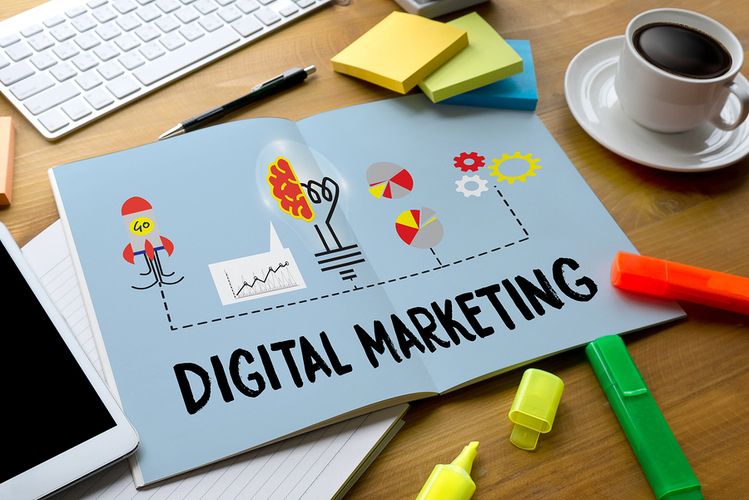How Is Digital Marketing Related to Search Engine Optimization?
January 9th 2019

SilverServers is a Kamloops web development company specializing in web solutions for small to medium businesses locally and around the world. Our team of web developers, graphic designers, and writers primarily focus on helping our clients grow their customer base by building up organic search engine results with search engine optimization (SEO) strategies. This method requires our web developers to stay up to date on the continuously changing algorithms that search engines employ to improve user experience.
To assist our clients in deciding if and when paid digital marketing would be a good business move, we hope to provide some insights about how digital marketing and search engine optimization compare and contrast. To get started on this, let's look closely at what exactly digital marketing is.
What Is Digital Marketing?
Digital marketing uses digital technologies to market products or services. Think of it as an umbrella term that includes numerous strategies, including SEO. Digital marketing includes online strategies such as SEO, search engine marketing (SEM) - like Google Ads, pay-per-click (PPC) and cost-per-click (CPC) advertising, social media marketing (SMM),content marketing, and email marketing. We will explore these following strategies in future articles.
• SEOaims to increase visitors, to increase your website's authority, and to improve your site's search rankings over time. Building authority with search engines takes time and consistency in posting high-quality SEO friendly content.
• SEMaims to gain website traffic with purchased ads on search engines. SEM can include paid search ads, PPC and its related CPC activities. Your business pays a certain amount each time an ad is clicked whether or not a purchase is made. Paid ads on Google are placed high in search results, therefore, can quickly drive traffic to your site.
• SMMaims to utilize social media platforms to market products or services. Because present and potential customers are most likely on Facebook, Instagram, Twitter, and so on, you may want to target some of these audiences. Platforms such as Facebook offer post boosting options in which you customize your budget and audience.
• Content marketing aims to educate your audience with high-quality content that is optimized for search engines, and is typically worded to include keywords people are using to find your site.
• Email marketing aims to send commercial messages to your database of prospects and customers. This can be a highly effective part of a business marketing strategy that allows for personalizing messages and tracking click and open rates.
Digital marketing may also include offline marketing, including text message offers, digital product demos, electronic billboards, radio and TV commercials and more. We will focus on online digital marketing in this article.
A unique feature that helps further define digital marketing is that it builds upon an understanding of customer behaviour. Digital marketing appeals to user behaviour, and is meant to increase conversions from visitor to customer of already existing traffic. Ads are meant to increase traffic too, but they may not do so on a permanent or consistent basis - they typically give temporary traffic boosts.
How is Customer Behaviour Determined?
A business website first must have enough traffic to analyze, and then be able to quantify the value of the actions taken by visitors. Most small to medium business websites do not typically get enough traffic to allow for a thorough customer behaviour analysis. If your business is getting sufficient traffic to analyze, are visitors downloading your apps or e-books? Are they retweeting your business posts on Twitter? Are they liking and sharing your posts on Facebook, LinkedIn or other channels?
If so, what exactly are they downloading, liking and sharing? These points are key, as your knowledge of this data allows you to focus your efforts on what people want. If traffic to your website is not consistently flowing and giving you data, it will be difficult to make good decisions about digital marketing tools. We recommend strengthening your SEO strategy to increase the flow of traffic in a cost-effective, long-term way.
Once you have an understanding of user behaviour, you can begin to fine-tune your digital marketing campaign, both paid and/or unpaid, to target a specific audience and to work on converting them into customers. If you determine that your business has a strong SEO basis and that paid advertising will add to your efforts to increase sales and exposure, it may be time to expand into paid digital marketing. Keep in mind that your paid digital marketing efforts should yield a conversion rate that allows you to at least break even.
At SilverServers, we can help your business set up any of the online digital marketing strategies noted above. Our Kamloops web developers have the experience to provide your business with a stunning website that is a fast, lightweight and effective marketing tool on the job 24/7. We would be happy to discuss your questions and concerns about digital marketing. Stay tuned for more articles about the relationship between digital marketing and SEO.
(Part 2: Key Differences Between SEO & Digital Marketing)
(Part 3: Building Website Authority From The Ground Up)
(Related: Social Media, Ads, or SEO: Which To Use and When)
Check out the Business Marketing and SEO section of our site for more articles!
Help Me Market My Website And Services


